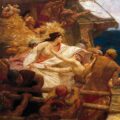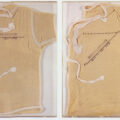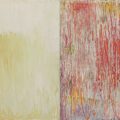Imagining Mothering (excerpt)

1.
A friend says motherhood is like living with your heart outside your body.
This is more like science fiction than it seems at first, I decide days after we’ve talked.
Imagination makes unavailable bodies visible, but only inwardly. Motherhood puts a body into the world. Motherhood therefore makes imagination real, while also—I don’t know if this is true, I’m following the thoughts of my friend—making bodies both more real and more imaginary, a mother’s body that can live without a heart.
Later, I’ll learn: there it is, in my arms, in the empty branches, bird, bird, bird, you say, responding to that alien starling, I look after you, not seeing, following your senses. It’s somewhere in that emptiness, and in our ears, a thrumming, a cry.
7.
I began to really imagine motherhood when teaching an essay by John Berger called “Ape Theater,” in which his mother quietly dies.
When she first appears in the opening paragraphs, Berger’s mother is largely an aside. The essay begins with the visits to the zoo Berger took with both his parents as a child. His mother didn’t like to go, but when she did, she would sometimes visit the bears. Berger and his father preferred the apes. “I can see now,” Berger writes long after her death, why she didn’t want to witness the distilled violence of chimpanzees and gorillas, “the passions which lead to the spilling of blood.”
Then his mother disappears, replaced by four pages on the melancholy of evolution’s long time scales and the differences and proximities between humans and apes. As a boy, this essayist spends a lot of time staring at monkeys through bars.
When his mother returns, she is first a kind of “thought,” and then quickly thereafter, on the same page, a ghost.
“My mother used to say,” Berger swerves in the middle of a paragraph that begins by reflecting on how apes, like humans, are “partly victims of their own bodies,” something about how chimpanzees would scrounge about in each other’s fur looking for fleas to exterminate. “But it goes further than Mother thought,” Berger amends. For primates, grooming is not only about hygiene, not only about the complaints of having a body. It’s also about pleasure, the surplus of what a body can do.
Berger’s correction of his mother is not only a correction of her thinking about bodies, but also a correction of bodies themselves as dutiful or predictable. It goes further than “Mother thought,” and it goes further than what any of us think about mothers, especially when it comes to what they may be thinking and what their bodies may be doing.
Berger, perhaps like a mother himself, is a master of withholding. Before the reader can hound him about the obliquity of these connections, he’s back to evolution! How apes evolved to use their arms more than other animals, by reaching for “fruit at the ends of branches!” (This is not Darwin’s understanding of evolution.) (“That is not what I meant at all.”)
When next we see his mother (in the very next, this jolting, paragraph), she is flanked on either side by natural selection:
I must have been two years old when I had my first cuddly toy. It was a monkey. A chimpanzee, in fact. I think I called him Jackie. To be certain, I’d have to ask my mother. She would remember. But my mother is dead. There is just a chance—one in a hundred million (about the same as a chance mutation being favoured by natural selection)—that a reader may be able to tell me, for we had visitors to our home in Higham’s Park, in East London, sixty years ago, and I presented my chimp to everyone who came through the front door. I think his name was Jackie.
As a reader, in no relation to Berger (my mother may not even have been born sixty years before the composition of this essay, and in any case, she had never left the country until I was 18 and moved to France to be a writer), I find the pathos of this paragraph almost over-powering.
After correcting his mother, after going on to demonstrate his very grown-up authorial prowess, yoking together the tactile details of observation in the present—the apes and their swinging limbs, gesturing hands—to the grandiose sweep of evolutionary time, the author exposes himself as once again, and perhaps even now, an anxious child, a very small child indeed, too young for the zoo, clutching a toy.
One of the essay’s ostensible subjects—evolutionary time—is sequestered within parentheses, while a single, wavering, childhood memory expands to momentarily distract the author from his purpose. Within this space, the kinds of certainty that drive essays, that carry them long enough in one direction to arrive at some place other than where they started, breaks down. Material conditions render imagination out of place. To be certain, Berger must ask his mother. But his mother is dead.
This is the only mention of his mother’s death, and the last time she appears, in the essay. Berger’s turn to the reader in the wake of this confession is not a chummy Victorian aside, “Reader, I loved,” but a frantic pawing after what a reader might possibly know or not know, how intimately the lives of readers and writers, children and mothers, may or may not be entwined.
Could you, reader, take the place of my mother, affirm that slight, vulnerable, knowledge that remains her dominion and that has disappeared with her death? But Berger doesn’t stay there. From the death of mothers, he shows us how, through the long, slow, sad, pacing of centuries, mutations and selections, the brachiation of the arms of our animal ancestors are becoming, become ours. [i]
15.
After the birth of my child, I lie in bed for a long time reading. Partly because I want to know what other women have written about becoming mothers, and partly because I can barely walk. When I say a long time, what I mean is several weeks, and then for months afterwards. Also, my breasts or my vagina leak every time I go anywhere, which is embarrassing. I prefer to read and not to leak.
I read Alice Notley, and Rachel Zucker, and along with much of a small section of the rest of the American reading public, Maggie Nelson’s The Argonauts. If you find yourself in a similar situation, or if you want to know more about how poems can migrate into conversations (arguments), or prose can swoop onward in conversation with itself, I can recommend these three writers to you. For each of them, motherhood, and writing, means something different; but for each, motherhood and writing are relational. I also read the second book of Karl Ove Knausgard’s My Struggle. There is a fantastic scene in which his wife, who is also a writer, gives birth to their first child. She is given gas during labor, which is rarely used in the United States, and keeps saying, again and again, throughout, that the gas is “fantastic.” If you find yourself in a different situation, this might be a better book for you. [ii]
A long time ago (I was seventeen), I read an article by Francine Prose that was about whether or not women writers necessarily wrote as women, whether women could ever escape their bodies enough to inhabit a language that was otherwise apart from them, genderless.
After Trump was elected, the British novelist Hillary Mantel wrote an essay in The New Yorker that I read before falling asleep by myself. (My husband is now sleeping on the love seat in our child’s room). The essay was about the election, but it was also about one of the many darknesses inside it: what this country understands as a “woman’s right to choose.” Of that terminology, Mantel corrects, “it’s not that sort of choice” not least of all because, it, whatever we call it, is “often made for us,” made of us.
But before she explains this, she relates an experience of thinking once, as a younger women, that she was pregnant, before that thought, or hope, or whatever you will call it—Mantel calls it “imagination”—was shredded by an encompassing pain, blood, and the years that followed. The imagination didn’t leave with the body, like a headache sometimes can when properly dosed. “Fragile, fallible,” Mantel writes, “it goes on working in the world.” [iii] The child she imagined, and may have even ectopically conceived, may have been material or flighty as fancy, the faculty Coleridge saw as more earthly than the imagination, and so the lesser of the two. Fancy-work became women’s work, at its most ornamental: lace or embroidery, delicate, never quite transparently not-there. [iv]
I have never read Hillary Mantel’s novels, although after reading this essay, I would like to try. The truth is, dear reader, I find fiction too emotionally exhausting, with no end to its imagining.
When my child was just becoming restless enough to prefer sprawling on the floor of a café, or pulling himself up against a wiry chair, I met a friend for coffee. She is a very successful professor, and not a mother, though she said of my child, “Oh my god, oh my god,” over and over again. We talked about genre.
She said, “We choose genres based on what we need to work on, in life.” If you study novels, you may have something to learn about character and plot, narrative and foreshadowing. If you study poetry, you may have trouble with form.
That essay by Lukács, the one that is not about “die werkliche Frau,” but that also nevertheless is, is called “The Foundering of Form Against Life.” Later, Lukács became one of the foremost theorists of “realist” fiction.
I have always preferred poems simply because they don’t make the same demands on the imagination. Narrative can be ruthless, in that it dares you to look away, and when you do, something beautiful and compelling is in an instant destroyed. In a poem, even an image becomes something else from line to line: “Petals on a wet, black bough.” [v] Poems are not imaginative acts; they are, as Keats said, feats of “negative capability.” [vi] But imagination, I suppose, can also be that negative, can go toward nothing, within.
Is imagination the opposite of memory? When you remember, you look backwards, and when you imagine, you look off into the future and the sunset glares back. But both memory and imagination have to do with calling on worlds, selves, experiences that aren’t immediately available.
I love my child more than I could have ever imagined it was possible to love. With a love it turns out it was never mine to give in the first place, that was given to both of us out of a body it turns out was never really mine. We have heard this all before: strangers we live within.
This is a horrible world, and so much of its horror depends on where and when a person is born. A child does not choose to be born. But a child can be chosen. The others that make that choice are our strangers, friends. Not only mothering needs to be imagined. We need to imagine the conditions that enable or delimit what it means for choice itself to be an imaginative act.
16.
One more mother appears in Berger’s essay “Ape Theater,” two short paragraphs after his mother dies.
But it is not Berger’s mother: “It is thanks to hanging from trees that one of the actors can throw himself into the arms of a mother and cry,” Berger writes. “Brachiation gave us breasts to beat and to be held against. No other animal can do these things.”
Berger’s essay is about, as much as an essay like this is ever truly about any one thing, watching animals as if watching theater. The actor with arms and breasts is an ape. But she is also his mother. He imagines motherhood even after his mother has gone. In another book, he imagines meeting his mother again and again, in an alleyway in Portugal, balanced along a precarious roof. There, she always appears and disappears as if from nowhere, through always mid-conversation. [vii] There should be a literary term for this. Like media res, or ex machina, but without ever being really before or after, memory or imagination, and without a god.
[i] John Berger, “Ape Theater,” in Why Look at Animals? (New York: Penguin, 2009).
[ii] Alice Notley, Grave of Light: New & Selected Poems, 1970-2005 (Middletown, CT: Wesleyan Press, 2006); Rachel Zucker, Mothers (Denver: Counterpath Press, 2014); Maggie Nelson, The Argonauts (Minneapolis: Graywolf Press, 2015); Karl Ove Knausgard, My Struggle (New York: Farrar, Straus, and Giroux), 2013.
[iii] Hillary Mantel, “The Rights of Women Under President Trump,” The New Yorker. November 21, 2016. Web. Accessed November 22, 2015.
[iv] Samuel Taylor Coleridge, Chapter 4, Biographia Literaria, ed. James Engell & W. Jackson Bate (Princeton: Princeton University Press, 1983), 69-88.
[v] Ezra Pound, “In a Station of the Metro.” Web. poetryfoundation.org. Accessed November 22, 2016.
[vi] John Keats, “Selections from Keats’s Letters (1817),” Web. poetryfoundation.org. Accessed November 22, 2016.
[vii] Berger, “Ape Theater,” Selected Essays (New York: Vintage, 2001), 546; Berger, Here is Where We Meet (London: Bloomsbury, 2005).
Top image: Anisa George, scene from Animal Animal Mammal Mine
About Gillian Osborne
Gillian Osborne is a poet, a mother, and a postdoctoral fellow in English at Harvard University’s Center for the Environment. In 2013, she was a co-organizer of a Conference on Ecopoetics at UC-Berkeley, and has published scholarship, essays, and reviews on nineteenth-century American authors, modern and contemporary poetry, and the politics of foraged foods at fancy restaurants.





